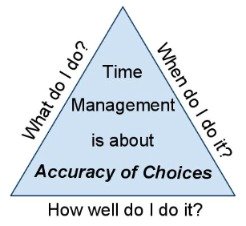Definition of Time Management
Time management boils down to three questions that we continually ask ourselves:
- What do I want to do?
- When do I want to do it?
- How well do I want to do it?
Notice the common thread throughout each of the three questions?
"...do I want to do...?"
That’s because time management is all about making, organizing and executing choices.
And you’ve always got a choice.
You can’t actually manage time itself. What you really manage is your use of time, and that means constantly making decisions about what to do, when to do it and how well to do it.
Let’s consider each part of this definition of time management in a bit more detail...
What do I want to do?
This is all about what to say 'yes' to in your life, and what to refuse, decline or let go.
It applies to anything, from an on-the-spot snap decision, beyond even major potential life changing commitments such as a relationship or career, all the way to your core beliefs and personal values.
Just like managing time, you can’t avoid doing it, so surely it makes sense to do it well?
Deciding what to do depends on three things:
- Your basic needs must be met to enable you to function -- these take up a sizable chunk of time each day. For example, the quality (and quantity) of sleep you get are dependent on several factors, many of which you can control if you choose to.
- You also have to decide how well to meet your current commitments. As long as you’re prepared to accept the consequences of your actions, you’ve always got a choice about how well to do what you ‘have’ to do.
- Then you need to decide how much time to give to unstructured activities, and how to spend that time. This doesn’t necessarily happen after you’ve met your basic needs and commitments -- these can both be cut short or neglected because you decide to give more time to what you want to do.
So a good definition of time management here is actually also an important series of questions...
How congruent are your tasks, projects, actions and habits with your roles, goals, values and beliefs? Do your beliefs define your roles and goals? If so, do your actions support them?
This is the point at which time management skills come into play...
If you’re wasting time or procrastinating, there are tips, techniques, tools and strategies to help you focus on doing what matters (plenty on this site, too!)
But the real power for deciding what to do comes from within.
Do you believe in what you’re doing? Do you even know what matters most to you?
Make it a priority to do so.
When you do, every role, goal, commitment, project, task, habit or action will make more sense and have so much more purpose and meaning.
When do I want to do it?
The second part of my definition of time management is about organizing your time -- choosing when to do something.
Here’s where you really benefit from knowing how to use time management tools, skills and strategies.
This can be hard -- when you want to do something may not actually be the best time to do it.
Willpower and self discipline are the key to delaying the gratification of Doing It Now.
What’s wrong with Doing It Now?
It’s a bad habit.
Reacting to things means other things get pushed aside. Things control you rather than you controlling them. (email is a great example of this).
Try out some time management systems to help you get organized and do things when it’s most appropriate to do so. Planners, diaries and schedules are essential for organizing what you’re doing and when.
Once you’ve decided what to do, work on getting better at knowing when to do it.
There is no formula for doing this. It just takes practice. Gradually, though, you’ll get better at knowing what to do when.
How well do I want to do it?
This is the the third part, the definition of time management that determines the degree to which you apply yourself to something or someone.
Some things in life are started and finished in one go such as making a drink or a short car journey. Other things can take longer -- a report, a project or even your health and relationships.
As well as deciding when to do it, you have to decide how long and how well you are prepared to do something for.
Understanding the Pareto Principle is important if you want to put more accurate and appropriate amounts of time and energy into whatever you deem is worth doing.
The importance of accuracy
Actually, that last sentence holds the keyword that sums up my definition of time management...
Accuracy.
The quality of your time management depends on the accuracy of three decisions you make throughout each day:
This is an ongoing challenge, one that never goes away.
But you're aware now, and that is the first step...
- Home ›
- Importance of Time Management ›
- Definition of Time Management


